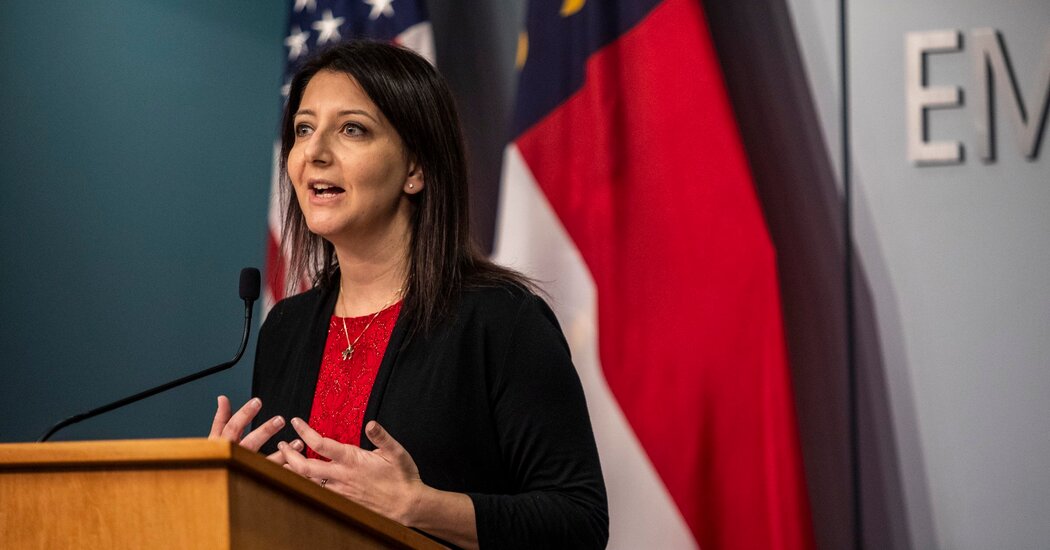
President Biden plans to name Dr. Mandy Cohen, a former North Carolina health secretary who steered her state through the tumultuous first two years of the coronavirus pandemic, as the next director of the Centers for Disease Control and Prevention, according to two people familiar with the selection process.
The selection of Dr. Cohen, which was first reported by The Washington Post, is not final. The White House is still putting together the necessary paperwork to make the appointment official, according to another person familiar with the selection process. But Dr. Cohen is the leading candidate, this person said.
The White House declined to comment. Dr. Cohen did not immediately respond to a request for comment.
If chosen by Mr. Biden, Dr. Cohen, an internist, would replace Dr. Rochelle P. Walensky, an infectious disease expert who announced last month that she would step down at the end of June. Dr. Walensky led the C.D.C. through difficult times; the agency had grown demoralized under President Donald J. Trump and drew fierce criticism under both Mr. Trump and Mr. Biden.
In North Carolina, Dr. Cohen served under Gov. Roy Cooper as secretary of the state’s Department of Health and Human Services from 2017 to 2021. In that post, she established herself as a familiar and steady voice who maintained the public’s trust despite deep political divisions, people who worked with her said.
Addressing graduating students at Guilford College in North Carolina last month, Dr. Cohen made trust the theme of her commencement speech. “Change happens at the pace of trust,” she said, adding that while it was possible to motivate people to change their behavior by scaring them, “fear will only get you so far.”
One point in Dr. Cohen’s favor is that, unlike Dr. Walensky, she has previous experience in the federal government. Before becoming North Carolina’s health secretary, she held several posts in the Obama administration, including serving as chief operating officer and chief of staff at the Centers for Medicare and Medicaid Services. Dr. Cohen is currently an executive at Aledade, a company that offers support to physicians and community health clinics.
Although Congress passed legislation last year requiring that the C.D.C. director be subject to Senate confirmation, the provision does not take effect until 2025, so Dr. Cohen could begin serving right away.
“Mandy Cohen used a steady hand to help my administration lead North Carolina through the pandemic to be among the states with the lowest deaths and job losses per capita,” Mr. Cooper, a Democrat, said in a statement. “She is a brilliant, talented and battle-tested leader who would be a fantastic C.D.C. director.”
Public health experts who know Dr. Cohen or have worked with her said her experience leading North Carolina’s pandemic response and her years at federal agencies would be a tremendous asset for a C.D.C. director. The C.D.C. has repeatedly come under fire during the pandemic for its muddled messaging, but Dr. Cohen drew praise as a clear communicator.
“North Carolina is a purple state, which is relevant when, you know, we were in a public health emergency that was extremely politicized,” said Dr. Neel Shah, the chief medical officer of Maven Clinic, a digital health care provider, who has known Dr. Cohen since they were both medical residents at Massachusetts General Hospital. He said Dr. Cohen “did an outstanding job of having an impact in that kind of climate.”
In the public health community, Dr. Cohen has a reputation for creating innovative programs, including a workaround to allow state governments to use Medicaid dollars to help low-income people with housing, food security and other needs that can affect their health.
“People talk about North Carolina with a measure of excitement in their voice,” said Dr. Joshua M. Sharfstein, the vice dean for public health practice and community engagement at the Johns Hopkins Bloomberg School of Public Health, who worked closely with Dr. Cohen when he was Maryland’s health secretary and she was a federal official.
The pandemic revealed a deep rift between public health and medicine, and Dr. Cohen is trying to bridge that divide, in part by having primary care physicians deliver preventive care, Dr. Sharfstein said.
“There’s a lot of opportunity at the intersection of health care and public health, and C.D.C. has not really been able to take advantage of those opportunities,” he said.
